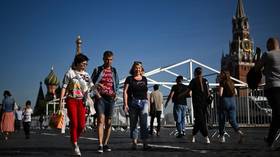broadsword
Brigadier
Tank biathlon final live, China, Russia, Uzbekistan, Belarus
Link not working for me.
Tank biathlon final live, China, Russia, Uzbekistan, Belarus
Link not working for me.
Regression back to Dark ages it seemsProbably a really bad time to have a family in the dead of winter with no heating. Someone really needs to ask these these leaders if they are willing to try do the same thing without any of their fake wealth. Is it me or are these leaders completely divorced from reality, because in regards to the Netherlands, how in Gods name are they going to survive if the farmers cannot grow any food for the people, especially when the government pushes the green agenda with the whole restriction on nitrogen. Do they think they can somehow buy food from overseas and sneak it in when the people are in the dead of winter and hungry and the first thing they will do when food comes in for these rich freaks, is pillage the food and don’t say that the military will guard the food because they will also pillage the food for their own families. They basically committed national suicide all in the name of a hatred that quite frankly would suit the opposition (Russia) far more then the Europeans given how much the aggression came from them rather then the other way round. I wonder if this will finally force these people to see reason. Everyone knows that the green new deal is dead on arrival given that instead of killing of the Russians and Chinese so that the Europeans can pillage their resources like a bunch of greedy pigs, it simply ended up putting the pig on the menu for both nations instead and the best part, is that this is all self inflicted. Not even the USA is safe from being subjected to self ownage given that they are also about to kill the golden goose (dollar reserves status) because they simply cannot resist the urge to harm others no matter how stupid it is to do so.

Well yeah, Russia is a major economy with control over a lot of goods, and they have many friends.Oops, didn't work...damn it.
Sanctions war isn’t going as planned – The Economist
The expected knockout blow from anti-Russia restrictions “has not materialized,” the UK magazine reports

People walking on the Red Square in Moscow. © AFP / Natalia Kolesnikova
The harsh sanctions imposed on Russia by the West over the conflict in Ukraine have so far been unable to deliver the desired result, The Economist magazine has acknowledged, adding that the strategy has “flaws.”
“Worryingly, so far the sanctions war is not going as well as expected,” the British publication in an article on Thursday, insisting that the effectiveness of economic restrictions on Moscow “is key to the outcome of the Ukraine war.”
“Russia’s GDP will shrink by 6% in 2022, reckons the IMF, much less than the 15% drop many expected in March... Energy sales will generate a current-account surplus of $265 billion this year, the world’s second-largest after China. After a crunch, Russia’s financial system has stabilized and the country is finding new suppliers for some imports, including China,” it pointed out.
At the same time, the energy crisis, which has been provoked by the sanctions war, “may trigger a recession” in Europe, where gas prices spiked by another 20% this week, according to the British magazine.
This all means that the expected “knockout blow [from restricting Russia] has not materialized,” The Economist said.
“The unipolar moment of the 1990s, when America’s supremacy was uncontested, is long gone, and the West’s appetite to use military force has waned since the wars in Iraq and Afghanistan,” it acknowledged.
Economic restrictions “seemed” to be the new tool that would allow the US, EU and its allies to project their power globally, but the conflict in Ukraine has revealed that “the sanctions weapon has flaws,” it said.
One of those flaws is “the time lag,” the magazine continued. For example, “blocking [Russia’s] access to tech the West monopolizes takes years to bite,” it added.
The Economist suggested that isolation from Western markets could only “cause havoc in Russia… on a three- to five-year horizon.”
“The biggest flaw [of sanctions] is that full or partial embargoes are not being enforced by over 100 countries with 40% of world GDP,” the outlet insisted. “A globalized economy is good at adapting to shocks and opportunities, particularly as most countries have no desire to enforce Western policy.”
With economic curbs failing to cripple the Russian economy, one should “discard any illusions that sanctions offer the West a cheap and asymmetric way to confront China” if it decides to use force against Taiwan, The Economist warned.
I wonder how soon is 'soon':
